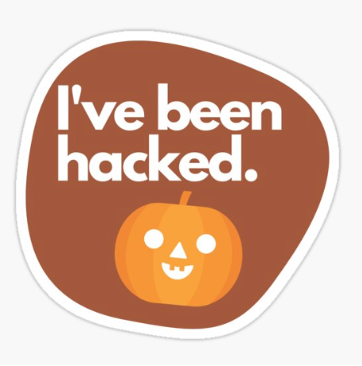A password reset email appears out of thin air.
Mysterious popups hover on your screen.
Your friends receive a link to your photos from Bermuda.
But you’ve never been to Bermuda.
Either spirits from the beyond are trying to communicate, or you’ve been hacked.
How to know if you’ve been hacked
Here are some common signs that your account, device, or data has been compromised:
- Password reset emails: One clear sign you’ve been hacked is receiving an email that your password was just reset, even though you didn't actually reset your password anywhere. A hacker may have reset your password and gained access your account. Or, the reset password email itself may be an attempt to make you click a link and provide your password. Always enable multifactor authentication for important accounts, and investigate suspicious activity by typing the relevant website’s URL into your browser. Don’t click links in unexpected emails.
- Random popups: If you receive random browser popups that you do not usually receive, this is a sign your web browser or computer may be compromised. These “adware” or “scareware” popups often look like antivirus warnings, but can come in a variety of other types. If this happens, you may need to delete or uninstall recently downloaded toolbars and apps Your antivirus software may be able to help diagnose the problem.
- Contacts receive fake emails or texts from you: Yikes! If these emails don’t come from your email address, your computer and system are likely safe. Hackers often pull contact email addresses from social media sites, which means you have not been personally compromised. If these emails come from your real email address, however, you have almost certainly been hacked.
- Redirected internet searches: If you click a search result and get redirected to a page you weren’t looking for, it’s a sign your search engine or web browser has been infected by malware.
- Internet connection slows down: If your computer or network starts to run noticeably slower, it might be a sign that a hacker is trying to carry out an attack using your system’s resources. Check out your Windows Task Manager or macOS Activity Monitor and run your security software to detect any viruses or malware.
- Ransomware message: A truly scary story to tell in the dark. Ransomware attacks generally occur when malware is installed, the system or your data gets locked, and the hacker demands a ransom payment to unlock it.
You’ve been hacked. Now what?
Here are some immediate steps you can take if you’ve identified a hack:
- If this is a Weill Cornell Medicine account or device, immediately contact ITS for assistance
- If this is a personal account or device:
- Change your passwords
- Call your bank to freeze any compromised bank accounts
- Update your operating system and software
- Uninstall any old, unused, or unrecognized apps or programs
- Scan your devices for malware with an up-to-date virus protection tool
- If malware can’t be found or removed, you may need to wipe your device and do a complete reinstallation of your operating system and applications. If you do this, make sure any files you need are moved to secure cloud storage, like OneDrive.
- If you’re uncomfortable with technology, connect with an ITS professional for help.
If you suspect the confidentiality or availability of high-risk data has been compromised (e.g. protected health information (PHI), personally identifiable information (PII), financial data, employment records, research involving human subjects, user account or system passwords) you should tell your supervisor, and report it right away to the ITS department, the Privacy Office, or WCM ITS Security:
Additional resources to keep your system secure
Some of the best actions you can take against hackers are preventative.
Sources:
https://www.infotrack.com/blog/signs-youve-been-hacked/
